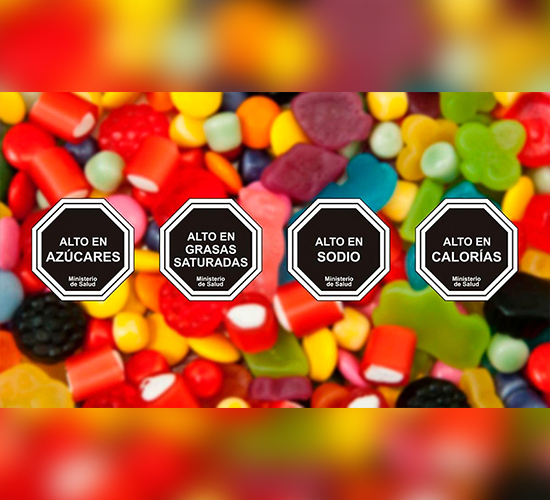Labeling Act: food policies reduced unhealthy grocery purchases

In June 2016, Chile implemented the Law on Labelling and Advertising, a package of evidence-based food policies, which includes mandatory front warning labeling on packaging of unhealthy groceries and beverages, restrictions on the marketing of such products and beverages targeted at children, and a ban on sales and offerings of these unhealthy products in schools. This law was implemented in three phases between 2016 and 2019, with strict nutrient cut-off points to determine which edibles and beverages required warning labels. The study assessed changes in purchases of high-calorie groceries and beverages, sugar, sodium and saturated fats after Phase 1 implementation.
The researchers analyzed food and beverage purchase data from more than 2,300 Chilean households between January 2015 and December 2017.. The first phase of the policy included the least restrictive nutrient cut-off points. Food and beverage products were classified as "rich in" when they contained additions of sugar, sodium or saturated fat and exceeded the nutrient or calorie thresholds of Phase 1 and, consequently, were subject to the labelling regulations, marketing and schools. This information was used to analyze calories (Kcal), sugar (Kcal), saturated fats (Kcal), and sodium (Mg) consumed per person daily before and after implementing Phase 1. The Dra. Institute of Nutrition and Food Technology academics (INTA) University of Chile, and one of the authors of the work, stresses that "it is essential to continue supporting the correct implementation of the law and moving forward with other complementary measures if we want to improve the nutrition of the population".
Labeling Act: Chile as a global example
Measures included in the Food Labelling and Advertising Act - such as warning stamps on products containing critical nutrients such as saturated fats, sugar, sodium and calories, and restrictions on the sale and advertising of these food products to children, limiting its offer in schools- have been promoted as an example at the international level, being recommended by institutions such as FAO and WHO. Like this, it has already been replicated in several Latin American countries such as Peru, Brazil and Mexico. In addition, Israel began its implementation and soon canada and india will also do so. "Chile's Food Labeling Laws are the most comprehensive package of laws in the world focused on preventing diseases such as obesity and cardiovascular conditions. improving food supply, achieve healthy diets", explains the Dra. Camila Corvalan, Institute of Nutrition and Food Technology academics (INTA) University of Chile.
Key findings
Comparing trends before implementing Phase 1, significant decreases in calorie purchases were observed, sugar, saturated fat and sodium, which was motivated by the reduction in purchases of unhealthy products and "high-in" unhealthy beverages in these nutrients (labeled products):
-In edibles and high-calorie beverages, purchases fell by 24% (49 kcal) daily per person, sugar purchases fell by 27% (21 kcal) per person per day, those of saturated fats decreased by 16% (6 kcal) per person per day and sodium decreased by 37% (97 mg) per person per day.
Purchases of the following "high-in" products in these contents decreased significantly after the policy was implemented: juices of industrialized fruits and vegetables (reduction of 47 percentage points (pp)), dairy beverages and substitutes (reduction of 31 percentage points), condiments and sauces (reduction of 33 percentage points), Meats, poultry and meat substitutes (reduction of 11 percentage points), breakfast cereals (reduction of 11 percentage points) and cereal-based sweets and desserts (reduction of 8 percentage points).
These decreases were also observed when analyzing all food and beverage purchases, although increases were observed in purchases of products without warning labels:
Of all food and beverages, purchases fell by 4% (16 kcal) daily per person, sugar purchases fell by 10% (12 kcal) per person per day, in saturated fats the decrease was 4% (2 kcal) per person per day and sodium decreased by 5% (28 mg) per person per day.

